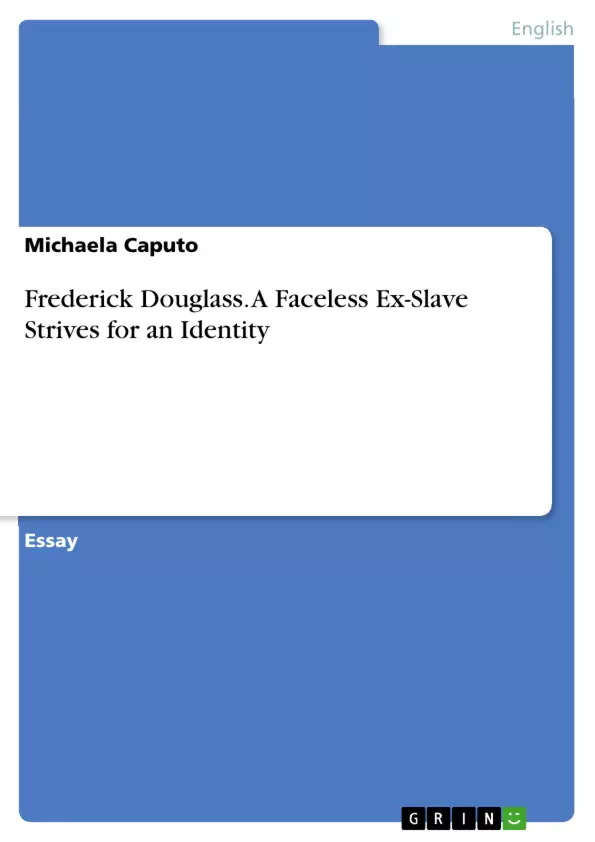This research paper refers to Frederick Douglass’s „Narrative“ to examine his personal development in terms of cultural memory and (cultural) identity. It will argue that Douglass, who had been deprived of his own culture by the dominant American system, was able to construct an African American identity for him and his fellow black Americans by resisting that system and by sharing his memories with the public.
Belonging to a social group of whatever kind and sharing its respective cultural memory is necessary to build up an identity. But what if you do not belong anywhere? What if you are a stranger to and not welcome in the society you are born into and, at the same time, are prevented from practicing your original culture? This was exactly the situation of black slaves in America before the Civil War preceding the abolition of slavery. They had been brought involuntarily to America, where they were treated as objects, and as mere working machines. They did not have any rights, and were prevented from any personal contact with their family. Thus they could not develop a cultural memory as a precondition for a culture identity, which would have been necessary for a healthy personal development.
An example for a person who has grown up as a slave in America is Frederick Douglass (1818-1881). He escaped from his masters at the age of 20 and led a life on the run until he became involved in the abolitionist cause. Being “the anti-slavery movement’s most eloquent and electrifying speaker”, he is remembered as one of its most important leaders. In his speeches, he mostly reported his own experience as a slave, showing “slavery’s horrible cruelties” and thereby trying to convince people of the abolition. Finally, he wrote three autobiographies, the first of which is called “Narrative of the Life of Frederick Douglass”.
Inhaltsverzeichnis (Table of Contents)
- Frederick Douglass: A Faceless Ex-Slave Strives for an Identity
- Introduction
- Cultural Memory and Identity
- The Problem of Identity Formation
- The Lack of a Cultural Memory
- Slaves and their Lack of Freedom of Expression
- Literacy, a Cultural Good of the American Culture
- Douglass's Fight for Literacy
- Douglass's Revolt Against his Master
- Conclusion
Zielsetzung und Themenschwerpunkte (Objectives and Key Themes)
The research paper examines Frederick Douglass's Narrative to explore his personal development in terms of cultural memory and identity. It argues that Douglass, deprived of his own culture by the dominant American system, constructed an African American identity for himself and his fellow black Americans by resisting that system and sharing his memories with the public.
- The impact of slavery on the formation of cultural memory and identity
- The role of literacy in shaping individual and collective identity
- The process of resistance against oppression and the construction of alternative identities
- The significance of shared memories in building community and challenging dominant narratives
- The relationship between individual agency and social structures in the pursuit of freedom and self-definition
Zusammenfassung der Kapitel (Chapter Summaries)
- The opening chapter of the Narrative highlights Douglass's lack of knowledge about his own origins and the absence of a family memory due to the forced separation from his mother and the suppression of his family's history.
- Douglass's childhood experiences as a slave are described, emphasizing the inhumane treatment he endured, the lack of affection and belonging, and the denial of basic human rights.
- The chapter explores the concept of cultural memory and how it is transmitted through social interaction, media, and shared experiences. Douglass's lack of access to the dominant American cultural memory is attributed to his status as a slave, highlighting the denial of freedom and the importance of literacy as a cultural good.
- Douglass's journey towards literacy is detailed, emphasizing the significance of education in shaping individual identity and challenging the prevailing power structures of slavery.
- The chapter focuses on Douglass's revolt against his master, Covey, as an act of resistance and a crucial step in his pursuit of self-determination and freedom. This event symbolizes his active struggle for agency and his refusal to be defined solely by the oppressive system he finds himself in.
Schlüsselwörter (Keywords)
This research paper focuses on cultural memory, identity, slavery, literacy, resistance, African American identity, and the narrative of Frederick Douglass.
Frequently Asked Questions
Who was Frederick Douglass?
Frederick Douglass (1818-1881) was an escaped slave who became a leading abolitionist, speaker, and author, famous for his narrative on the cruelties of slavery.
How did slavery impact cultural memory?
Slaves were often deprived of their origins and family history, preventing the formation of a stable cultural memory which is essential for a healthy personal identity.
What role did literacy play in Douglass's life?
For Douglass, learning to read and write was a crucial tool for liberation and self-definition, allowing him to challenge the dominant American system.
What is the significance of Douglass's revolt against his master?
His physical resistance against the "slave-breaker" Covey was a turning point, marking his transition from being a "faceless" object to a self-determined individual.
Why are shared memories important for the African American identity?
Sharing memories of slavery and resistance helped build a collective identity and community among black Americans, challenging the narratives of the slave-holding society.
- Citar trabajo
- Michaela Caputo (Autor), 2012, Frederick Douglass. A Faceless Ex-Slave Strives for an Identity, Múnich, GRIN Verlag, https://www.grin.com/document/379364



